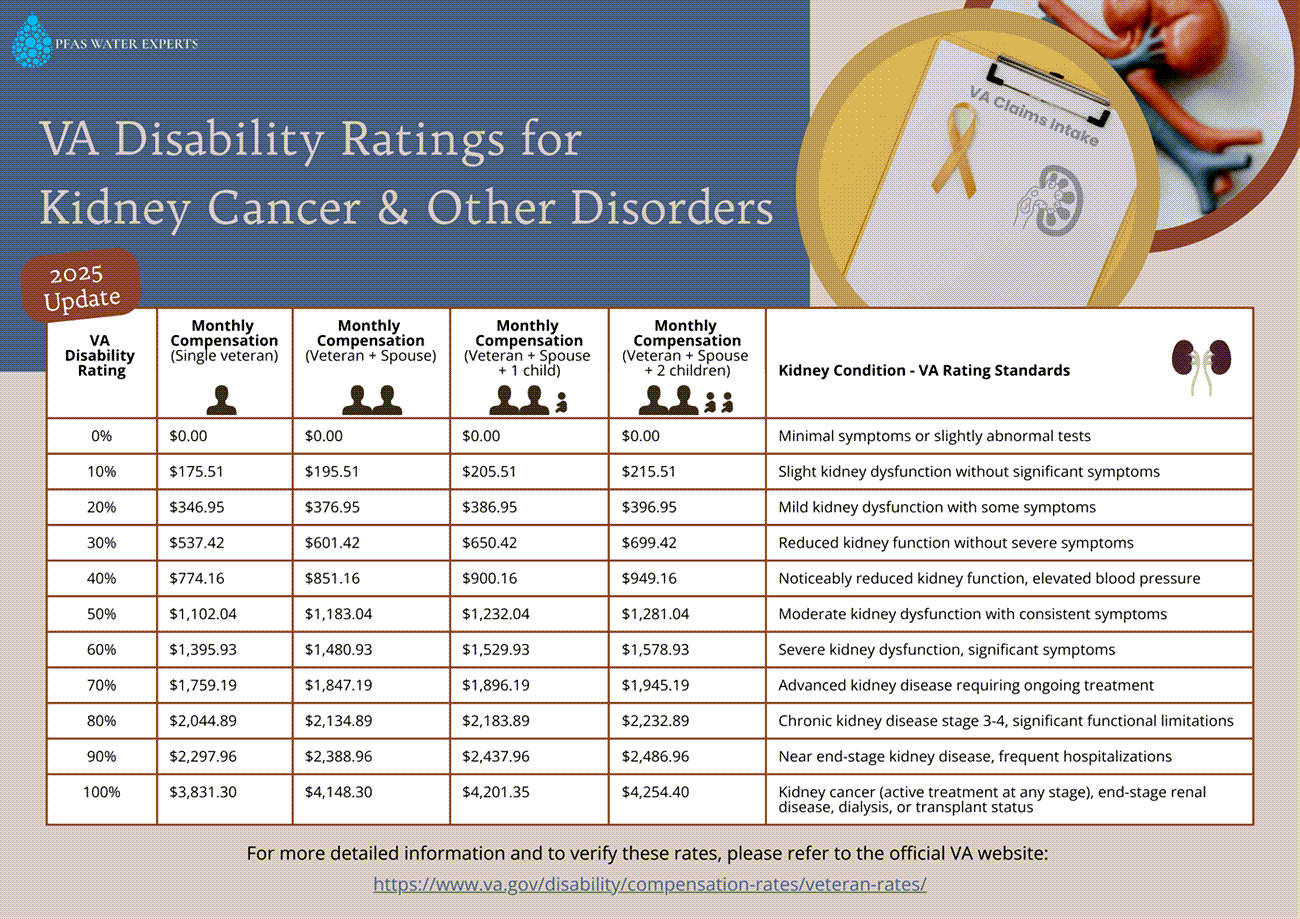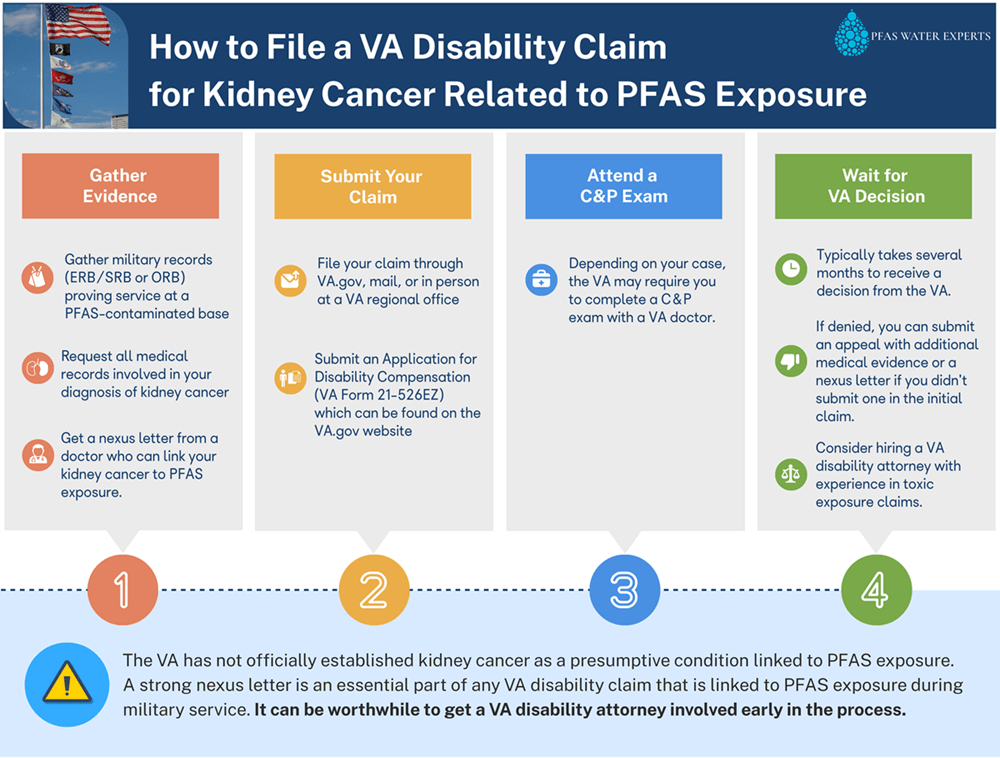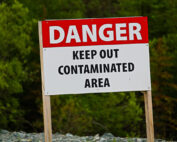Introduction
Veterans exposed to per- and polyfluoroalkyl substances (PFAS) during their military service may be at increased risk of developing kidney cancer, among other serious health conditions. PFAS, often called “forever chemicals,” were widely used in military firefighting foams (AFFF), industrial applications, and contaminated water supplies at military bases.
Despite growing evidence linking PFAS exposure to kidney cancer, the VA has not yet established kidney cancer as a presumptive condition under the PACT Act. This means veterans must prove that their condition is directly connected to their military service to qualify for VA disability benefits.
Understanding how the VA assigns disability ratings for kidney disorders and cancers related to PFAS exposure is crucial for veterans seeking rightful compensation and healthcare support.
This comprehensive guide details kidney disorders covered by the VA, the specifics of kidney cancer types, stages, VA disability ratings, compensation rates, potential causes, and strategies for appealing claim denials.
Kidney Disorders Covered by the VA
The VA recognizes several kidney conditions for disability compensation, including:
- Kidney Cancer (Renal Cell Carcinoma) – This cancer affects kidney tissues and is rated 100% disability during active malignancy treatment and reevaluated based on residual effects afterward.
- Chronic Kidney Disease (CKD) – Characterized by gradual kidney function loss. The VA rates CKD based on severity, typically relying on Glomerular Filtration Rate (GFR) and creatinine clearance tests.
- Renal Dysfunction – Includes impairment and reduced functionality of kidneys, rated similarly to CKD based on symptom severity and kidney function tests.
- Kidney Transplants – Veterans receive an automatic 100% disability rating for one year post-transplant, after which reevaluation occurs.
PFAS Exposure and Kidney Cancer
Kidney cancer, specifically renal cell carcinoma, is strongly associated with PFAS exposure. Veterans frequently exposed to AFFF (firefighting foam) containing PFAS chemicals at military installations are particularly at risk. These chemicals persistently accumulate in the body, significantly elevating the risk of kidney damage and malignancies.
Kidney Cancer Types and Stages
The primary kidney cancer affecting veterans exposed to PFAS is renal cell carcinoma (RCC). RCC stages determine the severity and the VA disability ratings:
- Stage I: Tumor confined to the kidney, under 7cm.
- Stage II: Tumor confined to the kidney, over 7cm.
- Stage III: Tumor spreading to nearby tissues and lymph nodes.
- Stage IV: Cancer has metastasized to distant organs.
The VA typically awards an immediate 100% disability rating during active cancer treatment. Post-treatment, the rating may adjust based on residual effects, even when in remission.
VA Disability Ratings for Kidney Disorders and Cancer
The VA assigns disability ratings from 0% to 100% for kidney disorders connected to military service, considering the severity and impact on daily life.
Here is how the VA typically rates kidney disorders and kidney cancer:
Kidney Cancer
- 100%: Automatically rated 100% during active, service-connected malignancy or kidney cancer treatment and for six months post-treatment. Post-treatment ratings beyond the first six months vary based on long-term effects (renal dysfunction, hypertension, overall health).
- 60%: If there is ongoing kidney dysfunction requiring frequent treatment after successful treatment of kidney cancer.
- 30%-60%: If the veteran has significant long-term residual effects after successful kidney cancer treatment such as chronic kidney disease or hypertension.
- 10%-30%: If the veteran has mild but persistent kidney dysfunction after successful kidney cancer treatment.
Kidney Disorders (Renal Dysfunction)
- 80-100%: Severe dysfunction requiring dialysis, transplant, or significantly impairing daily activities.
- 60%: More severe symptoms, elevated blood pressure, and noticeable reduced kidney function.
- 30%: Reduced kidney function without severe symptoms.
- 0%: Minimal symptoms or slightly abnormal tests.
Below is a more detailed chart of updated 2025 VA disability ratings and evaluation standards as they correlate to monthly compensation amounts.
Service-Connected Causes of Kidney Disorders and Cancer
Veterans typically develop kidney disorders and cancers due to various toxic exposures connected to military service, including but not limited to:
- PFAS (Per- and Polyfluoroalkyl Substances): Frequently found in firefighting foams (AFFF) used extensively at military bases, airfields, and naval facilities for training and emergency response scenarios. The AFFF runoff contaminated groundwater in over 700+ US military installations and the PFAS chemicals contained in AFFF leached into drinking water systems for decades without notice to military servicemen and their families.
- Agent Orange: Exposure primarily occurred among Vietnam War veterans. The herbicide contains harmful dioxins linked to kidney diseases and various cancers, including kidney cancer.
- Burn Pits: Commonly used in Iraq and Afghanistan to dispose of waste materials, these pits exposed veterans to numerous toxic substances capable of causing severe kidney conditions and cancer.
- Radiation Exposure: Military personnel exposed to radiation through nuclear testing, handling radioactive materials, or nuclear accidents face increased risks of kidney disorders and cancer.
- Industrial Solvents and Chemicals: Chronic exposure to industrial solvents, degreasers, and cleaning agents used in aircraft and vehicle maintenance is associated with heightened risk of renal dysfunction and kidney malignancies.
Understanding and documenting these exposures thoroughly is critical for veterans pursuing VA disability claims related to kidney disorders and cancers.
Getting a VA Disability Rating for Kidney Cancer
To qualify for VA disability benefits for kidney cancer related to PFAS exposure, a veteran must establish a service connection, which includes:
1. Proof of Military Service at a PFAS-Contaminated Location
Veterans must show they served at a military base where PFAS contamination has been documented.
Hundreds of military bases have been tested and known to have high PFAS contamination levels. That list continues to grow as more bases test their drinking water systems for contamination.
Veterans can check the latest military base PFAS contamination list and obtain a copy of their Enlisted Records Brief (ERB/SRB) or Officer Records Brief (ORB for officers) for additional proof. These records will include all PCS and TDY assignments, dates of assignment, training, occupational specialties or ratings, and any deployments.
2. Diagnosis of Kidney Cancer
- Veterans must provide a confirmed diagnosis of renal cell carcinoma or another kidney cancer type.
- Medical records, pathology reports, and imaging scans (MRI, CT, ultrasound) should be included in the VA claim.
3. Nexus Letter or Medical Evidence Linking PFAS Exposure to Kidney Cancer
Since kidney cancer is not yet a presumptive condition, veterans must provide medical evidence linking their cancer to PFAS exposure.
A nexus letter from a qualified medical professional should state “It is at least as likely as not” that the veteran’s kidney cancer was caused by PFAS exposure.
Veterans can reference scientific studies, such as:
- 2022 National Cancer Institute (NCI) study linking PFAS to increased kidney cancer risk.
- Environmental Health Perspectives 2023 report, showing a higher incidence of kidney cancer among PFAS-exposed military personnel.
How to File a VA Disability Claim for PFAS-Related Kidney Cancer
Step 1: Gather Evidence
- Military records proving service at a PFAS-contaminated base.
- Medical diagnosis of kidney cancer from a VA or private physician.
- PFAS blood test results (if available) to show contamination levels.
- Nexus letter from a doctor supporting the connection between PFAS exposure and kidney cancer.
Step 2: Submit Your VA Claim
- File a claim online through VA.gov, by mail, or in person at a VA regional office.
- Submit VA Form 21-526EZ (Application for Disability Compensation).
Step 3: Attend a C&P Exam
The VA may require a Compensation & Pension (C&P) exam, where a VA doctor evaluates the severity of kidney cancer and its impact on daily life.
Step 4: Wait for the VA Decision
- VA claims processing can take several months.
- If denied, veterans can appeal by submitting additional medical evidence or requesting a Board of Veterans’ Appeals hearing.
Why the VA Might Deny a PFAS-Related Kidney Cancer Claim
Claims related to PFAS exposure face hurdles, including:
- Lack of Presumptive Conditions: VA has not officially established kidney cancer as presumptively linked to PFAS exposure, requiring veterans to present substantial medical and exposure evidence.
- Insufficient Medical Evidence: Missing detailed medical nexus letters or incomplete medical documentation connecting cancer explicitly to PFAS.
- Inadequate Exposure Proof: Failure to demonstrate specific incidents or prolonged exposure periods during military service.
Critical Steps to Appeal a Denied PFAS VA Claim
If your claim is denied, consider the following:
- Gather Additional Evidence: Obtain detailed nexus letters from qualified medical experts explicitly linking kidney cancer to PFAS exposure.
- Access Military Records: Request comprehensive military service and medical records through the National Archives or directly from the VA.
- File Notice of Disagreement (NOD): Formally dispute the denial, clearly stating your disagreement reasons and attaching supporting documentation.
- Seek Representation: Engage experienced veterans’ disability attorneys or accredited claims agents familiar with toxic exposure claims.
- Board of Veterans’ Appeals (BVA): If initial appeals fail, request a hearing before the BVA. Clearly present your evidence and testimony linking PFAS exposure and kidney cancer.
Kidney Cancer Claims in the AFFF Lawsuit
Veterans and their dependents diagnosed with kidney cancer should strongly consider participating in the ongoing AFFF lawsuit, as kidney cancer is one of the primary conditions qualifying for claims. Time to register is limited, with initial trials beginning this October (2025), so the window to sign up may close imminently.
One of the benefits of joining the AFFF lawsuit is that legal and medical experts will do the heavy lifting of gathering legal, medical, and scientific evidence to prove your kidney cancer is service-connected.
Conclusion
Navigating VA disability claims for kidney cancer related to PFAS exposure can be complex and challenging, but understanding the process, ratings, and effective appeal strategies enhances your likelihood of success. Veterans impacted by PFAS exposure should actively document their medical conditions, seek detailed medical evaluations, and remain proactive throughout the claims process to ensure rightful compensation and healthcare support.
Jump to a topic
- Introduction
- Kidney Disorders Covered by the VA
- PFAS Exposure and Kidney Cancer
- VA Disability Ratings for Kidney Disorders and Cancer
- Service-Connected Causes of Kidney Disorders and Cancer
- Getting a VA Disability Rating for Kidney Cancer
- How to File a VA Disability Claim for PFAS-Related Kidney Cancer
- Why the VA Might Deny a PFAS-Related Kidney Cancer Claim
- Critical Steps to Appeal a Denied PFAS VA Claim
- Kidney Cancer Claims in the AFFF Lawsuit
- Conclusion






